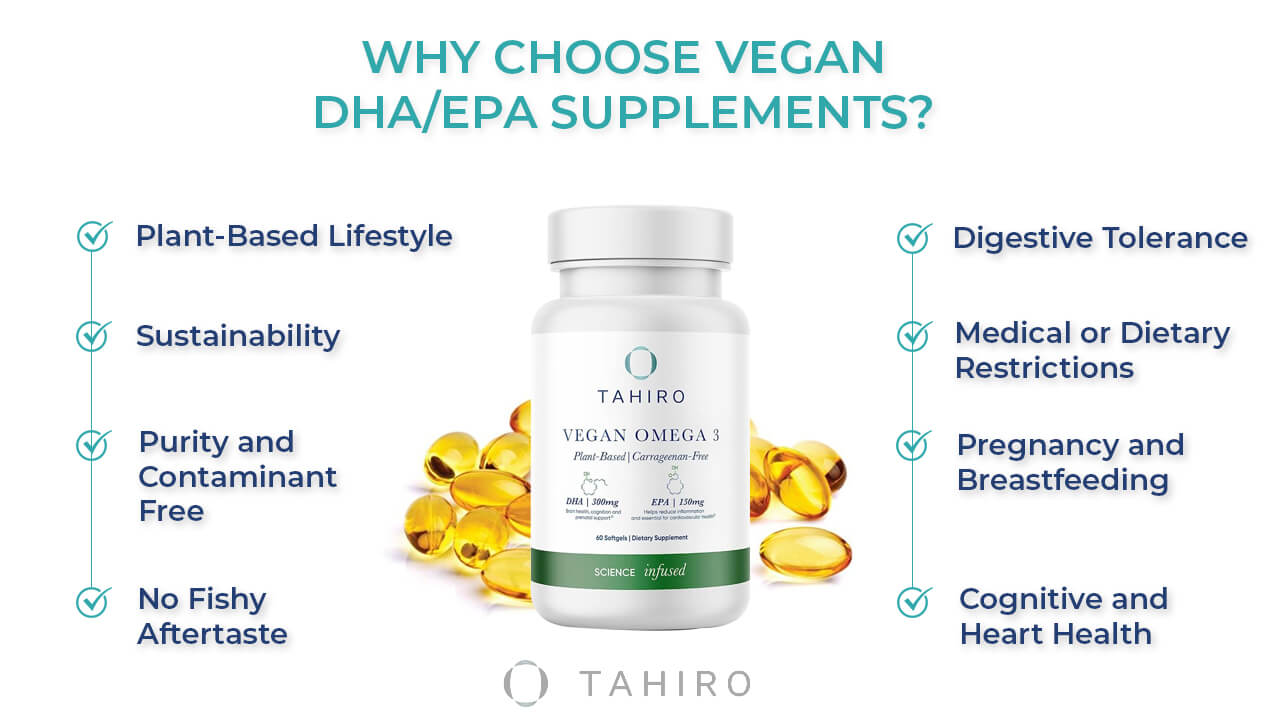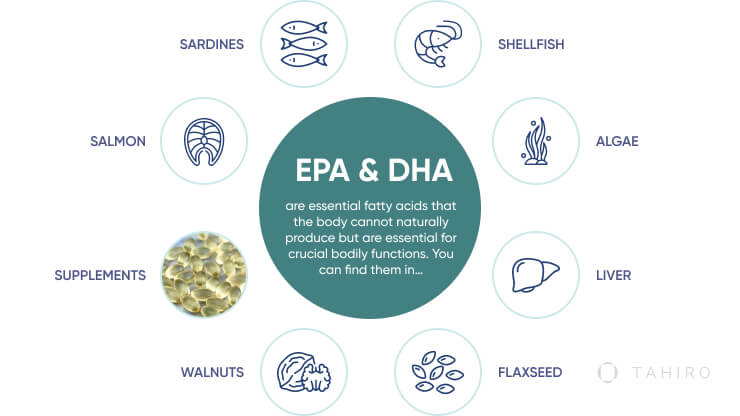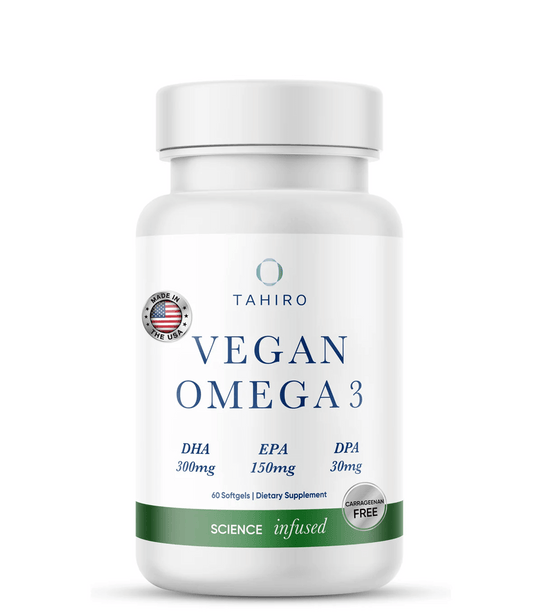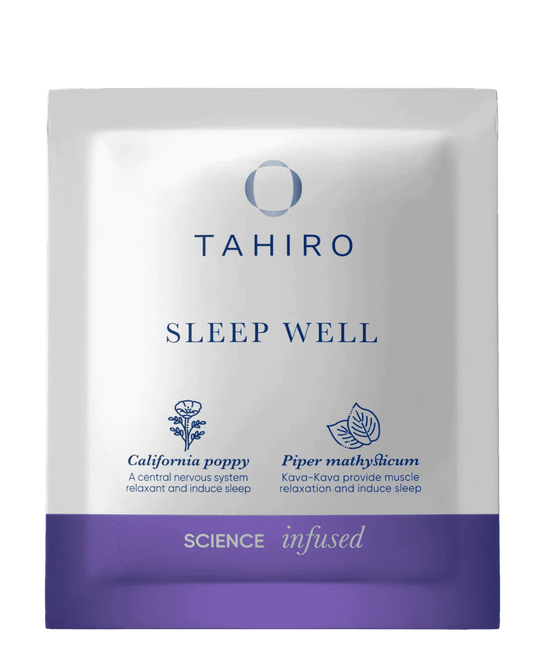In recent years, the growing interest in the role of essential fatty acids, particularly EPA (eicosapentaenoic acid) and DHA (docosahexaenoic acid), has reached new levels of awareness. These omega-3 fatty acids, primarily found in fatty fish and algae, have garnered attention for their potential to support various bodily functions and enhance overall wellness.
In this article, we'll explore all the known health benefits of EPA and DHA to better understand how they contribute to our general health and well-being
What are EPA and DHA?
EPA (eicosapentaenoic acid) and DHA (docosahexaenoic acid) are two types of long-chain omega-3 fatty acids. They are essential nutrients crucial in maintaining overall health, particularly in supporting cardiovascular, brain, and inflammatory processes. EPA is a type of omega-3 fatty acid found in certain fish, algae, and fish oil supplements. DHA is another type of long-chain omega-3 fatty acid found in fatty fish, algae, and fish oil supplements. We will review the benefits, dosing, and possible side effects of these potent fatty acids. Tahiro’s Algae Omega 3 has a combined DHA and EPA dose of 450 mg.
What are the Health benefits of EPA and DHA?
The health benefits of EPA and DHA are essential to understanding how these fatty acids can improve your mental and physical functioning.
-
Fights Inflammation: Omega 3 fats such as DHA can have anti-inflammatory benefits. Inflammation is implicated in rheumatoid arthritis, heart and gum disease, and other autoimmune conditions.
-
Reduces the Risk of Early Preterm Births: Women who consumed 600-800 mg of DHA during pregnancy reduced their risk of premature birth by 40%. [1]
-
Improves ADHD: Children and adults can have lower levels of DHA, and one review showed that DHA supplements for children with ADHD showed improvement. [2]
-
Supports Muscle Recovery After Exercise: DHA and EPA can help reduce muscle soreness by reducing the inflammation caused by strenuous exercise. [3]
-
Eye Health: More study is needed to determine the full range of benefits from DHA and EPA. But we do know that DHA and EPA supplementation decreased eye pressure (a risk factor for Glaucoma). [4]
-
Reduce Your Risk of Certain Cancers: Chronic inflammation can be a risk factor for cancer, and higher intake of omega-3 fats has been linked to lower incidence of pancreatic, breast, colorectal, and prostate cancer. DHA may also suppress cancer cell growth. [5]
-
Prevent or Slow Alzheimer’s Disease: Alzheimer’s disease is a devastating condition without a current cure or treatment. People with Alzheimer’s have lower levels of DHA. Some evidence suggests that a higher intake of omega-3 fats before brain function declines may improve mental abilities. [6]
-
Lowers Blood Pressure: Good blood flow and circulation are critical to heart health. EPA and DHA have been shown to reduce blood pressure. [7]
-
Fetal/Neonatal Development: DHA is necessary for eye and brain development in babies. When women are pregnant, they need adequate DHA to ensure the proper mental acuity and functioning of their babies. [8]
-
Men’s Reproductive Health: Dietary fat intake affects sperm health. Low DHA is found in men with low-quality sperm and infertility problems.
-
Reduce Depression: Adequate intake of EPA and DHA is associated with a reduced risk of depression. [9] EPA increases serotonin release, a critical hormone related to mood.
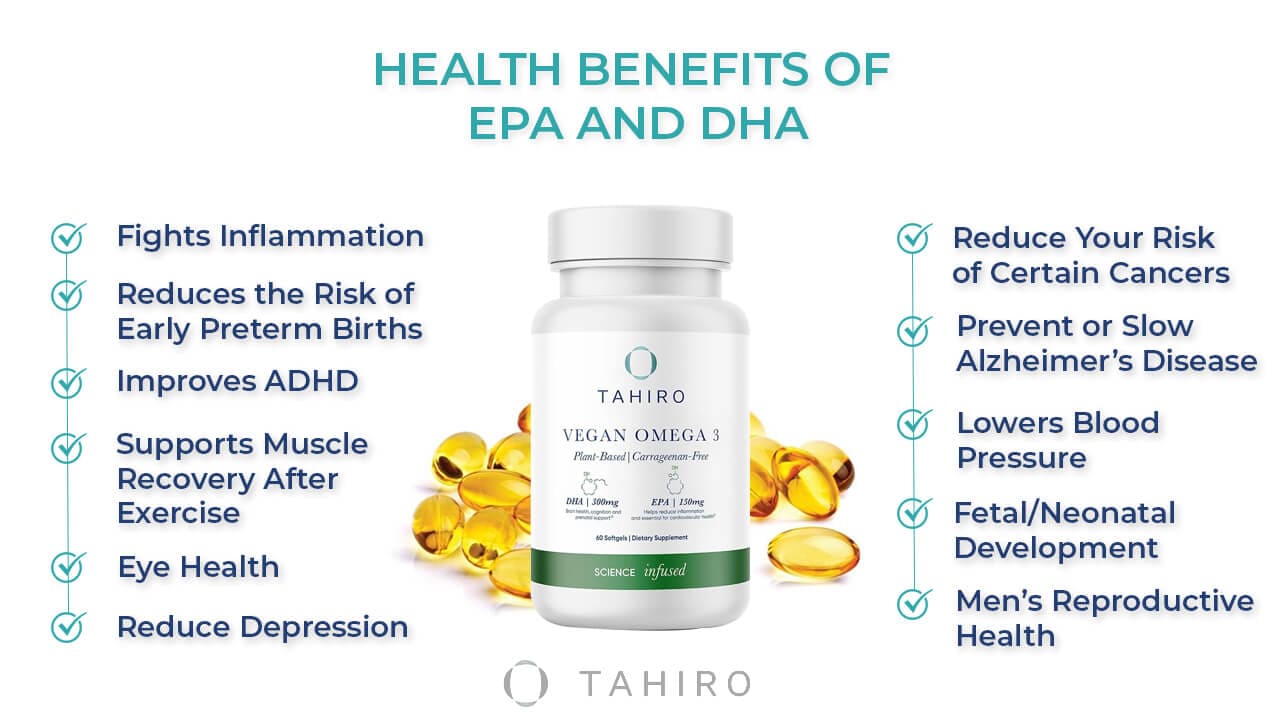
What Dose of DHA and EPA Do You Need?
Recommended doses of DHA and EPA vary widely depending on the health conditions you want to treat. [10] Studies show varying amounts of EPA and DHA for heart disease, depression and anxiety, cancer, children, and pregnant women. A general guideline is 250-500 mg of EPA and DHA combined per day.
Side Effects of DHA and EPA
You can expect few if any, side effects in appropriate recommended doses of DHA and EPA. However, higher doses could have adverse effects, such as
-
Blood Thinning and Bleeding Risk: EPA and DHA have natural blood-thinning properties, which can benefit heart health. Still, in higher doses, they may increase the risk of bleeding, especially when combined with other blood-thinning medications (e.g., warfarin) or if you have a bleeding disorder.
-
Gastrointestinal Distress: Some people may experience bloating, gas, indigestion, or diarrhea, but usually, when taking higher doses of EPA and DHA.
-
Fishy Aftertaste or Burps: Fish oil supplements containing EPA and DHA can sometimes cause a fishy aftertaste or fishy-smelling burps.
-
Interaction with Medications: As a precaution, if you take any other medications, especially blood-thinning ones, check with your health provider before taking products containing EPA and DHA.
-
Potential Allergic Reactions: Although rare, some people have allergic reactions to fish oil or omega-3 supplements.
Why Choose Vegan DHA/EPA Supplements?
Choosing vegan DHA and EPA supplements can offer several benefits, especially for individuals who prefer plant-based or vegetarian lifestyles. Here are some reasons why you might consider opting for vegan sources of DHA and EPA:
-
Plant-Based Lifestyle: If you prefer a vegan or vegetarian diet, you can still acquire essential omega-3 fatty acids EPA and DHA and avoid fish. Vegan supplements provide a cruelty-free and ethical option.
-
Sustainability: Overfishing to obtain omega-3 can harm marine ecosystems. Choosing vegan sources, such as algae-derived DHA and EPA, supports more sustainable practices and reduces the pressure on fish populations.
-
Purity and Contaminant-Free: Fish-derived omega-3 supplements may contain contaminants like heavy metals such as mercury, PCBs, and other environmental toxins. Vegan DHA and EPA supplements derived from algae are often cultivated in controlled environments, minimizing the risk of contamination.
-
No Fishy Aftertaste: Fish oil supplements can sometimes lead to a fishy aftertaste or burps, which some people find unpleasant. Vegan algae oil supplements are less likely to cause this issue.
-
Digestive Tolerance: Some individuals may experience gastrointestinal discomfort or indigestion when taking fish oil supplements. Algae-based supplements may be gentler on the digestive system for sensitive people.
-
Medical or Dietary Restrictions: Individuals with fish or seafood allergies or those advised to limit fish consumption due to medical reasons can benefit from vegan DHA and EPA supplements.
-
Pregnancy and Breastfeeding: Pregnant and breastfeeding women who want to ensure adequate DHA intake for fetal brain and eye development may choose vegan DHA supplements.
-
Cognitive and Heart Health: Omega-3 fatty acids, particularly DHA and EPA, are associated with cognitive function, heart health, and other benefits. Vegan sources provide these nutrients without the need for fish-derived products.
